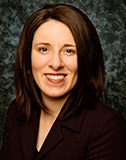CV: Dr. Frances Wright
Bio basics: An associate scientist in the combined health services sciences discipline and cancer program at SRI. Attended medical school at the University of Toronto (U of T), did her surgical residency at Queen's University, and finished her surgical oncology fellowship and her master of education at U of T. From England originally, where she grew up with her schoolteacher mother and nephrologist/clinical toxicologist father, Wright moved to Canada in 1982. She's married with two kids, aged nine and six, and lives with her family in north Leaside.
What did you want to be when you were growing up?
A doctor.
What's the most exciting news in cancer research today?
Targeted therapy. This means that you can individualize patients' treatment. This approach allows physicians to "gene profile" tumours so they can identify whether a patient is high risk. It's all about tailoring systemic therapy to a patient's cancer. And it puts an emphasis on quality care.
What are some inherent problems with current approaches to scientific research?
In my research, knowledge translation, it's often difficult to prove that an intervention itself has changed outcomes because of the emphasis on quality care from quality agencies like Cancer Care Ontario.
What in your research recently has most surprised you?
How accurate magnetic resonance imaging (within 3mm) is for assessing residual disease after chemotherapy for locally advanced breast cancer. Also, how enthused clinicians are about trying to improve their own clinical practice, based on lessons learned from knowledge-transfer work.
What's the best part of being a scientist?
Being a scientist allows you to think and reflect on your own practice. You get to take a bigger-picture look at what we do day-to-day in clinical practice.
What's the most frustrating part of your job?
Research is a full-time job-if you want to do it properly. That means attention to detail. It's hard to balance this with clinical work. However, clinical work often gives you the ideas to do the research. It's a double-edged sword.
In a perfect world, what?
Dedicated research time with no interruptions! The perfect life, with a perfect clinical-research balance.



